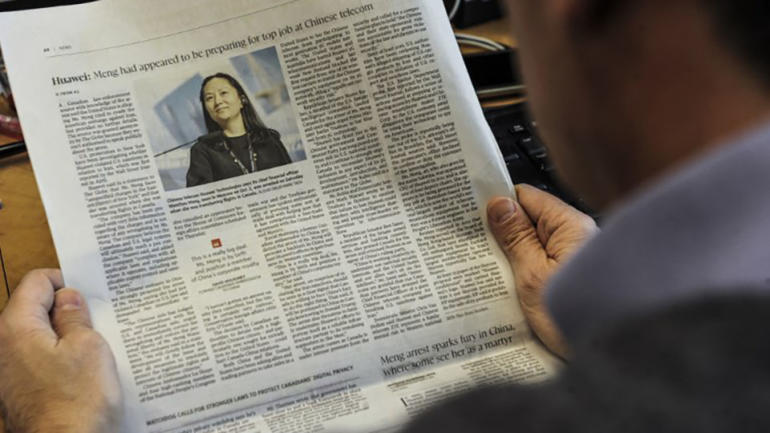Huawei Technologies Co Ltd’s chief financial officer faces U.S. accusations that she covered up her company’s links to a firm that tried to sell equipment to Iran despite sanctions, a Canadian prosecutor said on Friday, arguing against giving her bail while she awaits extradition.
CGTN’s Natalie Carney reports.
After nearly six hours of arguments and counter-arguments, no decision was reached and the hearing was adjourned until Monday 10:00 a.m. Pacific Time (1800 GMT).
The case against Meng Wanzhou, who is also the daughter of the founder of Huawei [HWT.UL], stems from a 2013 Reuters report here about the company’s close ties to Hong Kong-based Skycom Tech Co Ltd, which attempted to sell U.S. equipment to Iran despite U.S. and European Union bans, the prosecutor told a Vancouver court.
U.S. prosecutors argue that Meng was not truthful to banks who asked her about links between the two firms, the court heard on Friday. If extradited to the United States, Meng would face charges of conspiracy to defraud multiple financial institutions, the court heard, with a maximum sentence of 30 years for each charge.
Meng, 46, was detained in Canada on Dec. 1 at the request of the United States. The detainment was on the same day that U.S. President Donald Trump met in Argentina with China’s Xi Jinping to look for ways to resolve an escalating trade war between the world’s two largest economies.
The news of her detainment has roiled stock markets and drawn condemnation from Chinese authorities, although Trump and his top economic advisers have downplayed its importance to trade talks after the two leaders agreed to a truce.
A spokesman for Huawei had no immediate comment on the case against Meng on Friday. The company has said it complies with all applicable export control and sanctions laws and other regulations.
Friday’s court hearing is intended to decide on whether Meng can post bail or if she is a flight risk and should be kept in detention.
The prosecutor opposed bail, arguing that Meng was a high flight risk with few ties to Vancouver and that her family’s wealth would mean than even a multi-million-dollar surety would not weigh heavily should she breach conditions.
Meng’s lawyer, David Martin, said her prominence made it unlikely she would breach any court orders.
“You can trust her,” he said. Fleeing “would humiliate and embarrass her father, whom she loves,” he argued.
The United States has 60 days to make a formal extradition request, which a Canadian judge will weigh to determine whether the case against Meng is strong enough. Then it is up to Canada’s justice minister to decide whether to extradite her.
Chinese Foreign ministry spokesman Geng Shuang said on Friday that neither Canada nor the United States had provided China any evidence that Meng had broken any law in those two countries, and reiterated Beijing’s demand that she be released.
Chinese state media accused the United States of trying to “stifle” Huawei and curb its global expansion.
 CGTN America
CGTN America
 An illustration shows a journalist reading a news page about tech giant Huawei in The Globe and Mail in Montreal, Canada, December 6, 2018. – The arrest of a top executive of Huawei at the request of US authorities signals a toughening stand in Washington on dealing with Chinese tech firms amid longstanding concerns over cyberespionage. Meng Wanzhou (pictured on the news page), Huawei’s chief financial officer, was detained this week in Canada and faces an extradition request from US authorities over an investigation into suspected Iran sanctions violations by the Chinese technology giant. (Photo by Clement SABOURIN / AFP) / RESTRICTED TO EDITORIAL USE
An illustration shows a journalist reading a news page about tech giant Huawei in The Globe and Mail in Montreal, Canada, December 6, 2018. – The arrest of a top executive of Huawei at the request of US authorities signals a toughening stand in Washington on dealing with Chinese tech firms amid longstanding concerns over cyberespionage. Meng Wanzhou (pictured on the news page), Huawei’s chief financial officer, was detained this week in Canada and faces an extradition request from US authorities over an investigation into suspected Iran sanctions violations by the Chinese technology giant. (Photo by Clement SABOURIN / AFP) / RESTRICTED TO EDITORIAL USE
